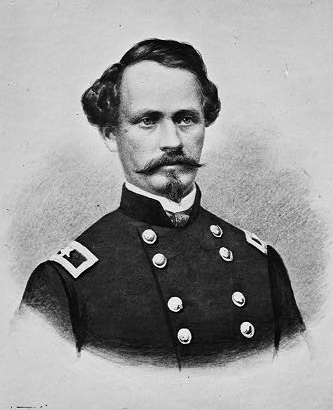Alvin Peterson Hovey
Alvin Peterson Hovey was born on September 6, 1821, in Mount Vernon, Indiana, to Abiel Hovey and Frances Peterson. His father died in 1823, and his mother followed in 1836. He spent several years in an orphanage and earned money by working as a bricklayer. He began studying law around 1840 and opened his own law office three years later. He married Mary Ann James on November 24, 1844, and they had five children: Esther, born around 1846; Enoch, born around 1848; Charles, born around 1850; Mary, born around 1854; and Mary Ann, born around 1857. Only two of their children survived to adulthood.
Hovey joined the Democratic Party and served in Indiana’s 1851 constitutional convention. He opposed extending suffrage to women and African Americans and supported a provision barring free African Americans from entering the state. Governor Joseph Wright appointed Hovey to the state Supreme Court in 1854, and he served for about six months.
He became a U.S. Attorney for Indiana in 1855, but President James Buchanan removed him from office several years later. Indiana’s proslavery Democrats expelled Hovey from the party in 1858. He ran for Congress as an Independent that year but lost by an overwhelming margin. He then joined the Republican Party. By 1860, he was living in Black, Indiana, and he owned $30,000 of real estate and $10,000 of personal property.
When the Civil War erupted, Hovey became colonel of the 24th Indiana Infantry. He took part in the Battle of Shiloh, the siege of Corinth, and the siege of Vicksburg, and he earned a promotion to brigadier general. His wife died in 1863, and he returned home to care for his children. He returned to the frontlines in 1864 and participated in the Atlanta campaign. In the fall of 1864, however, the army discontinued his division and reassigned Hovey to Indiana. He resigned from the army on October 7, 1865.
He married Rose Alice Smith around 1865, but she fell ill and died soon afterward. He became Minister to Peru in the 1860s and remained there until 1870. He then returned to Mount Vernon, Indiana, and resumed his legal practice. In 1870, he owned $145,600 of real estate. Voters elected him to Congress in 1886, and he became governor of Indiana two years later. He served until January 1889, and he died in Indianapolis, Indiana, on November 23, 1891.
Image: Alvin Peterson Hovey (courtesy Wikicommons)
DATABASE CONTENT
| (1185) | Hovey, Alvin Peterson | 1821-09-06 | 1891-11-23 |
- Conflict Side: Union
- Role: Soldier
- Rank in: Colonel
- Rank out: Brigadier General
- Rank highest: Brigadier General
- Gender: Male
- Race: White
Documents - Records: 1
- (4833) [writer] ~ John S. Simonson et al. Statement, 5 June 1865
Places - Records: 2
Groups - Records: 2
SOURCES
“Alvin Peterson Hovey,” Wikipedia Profile, available from Wikipedia.org; 1860, 1870, and 1880 United States Federal Censuses, available from Ancestry.com; Indiana Marriage Index, 1806-1861, available from Ancestry.com.





